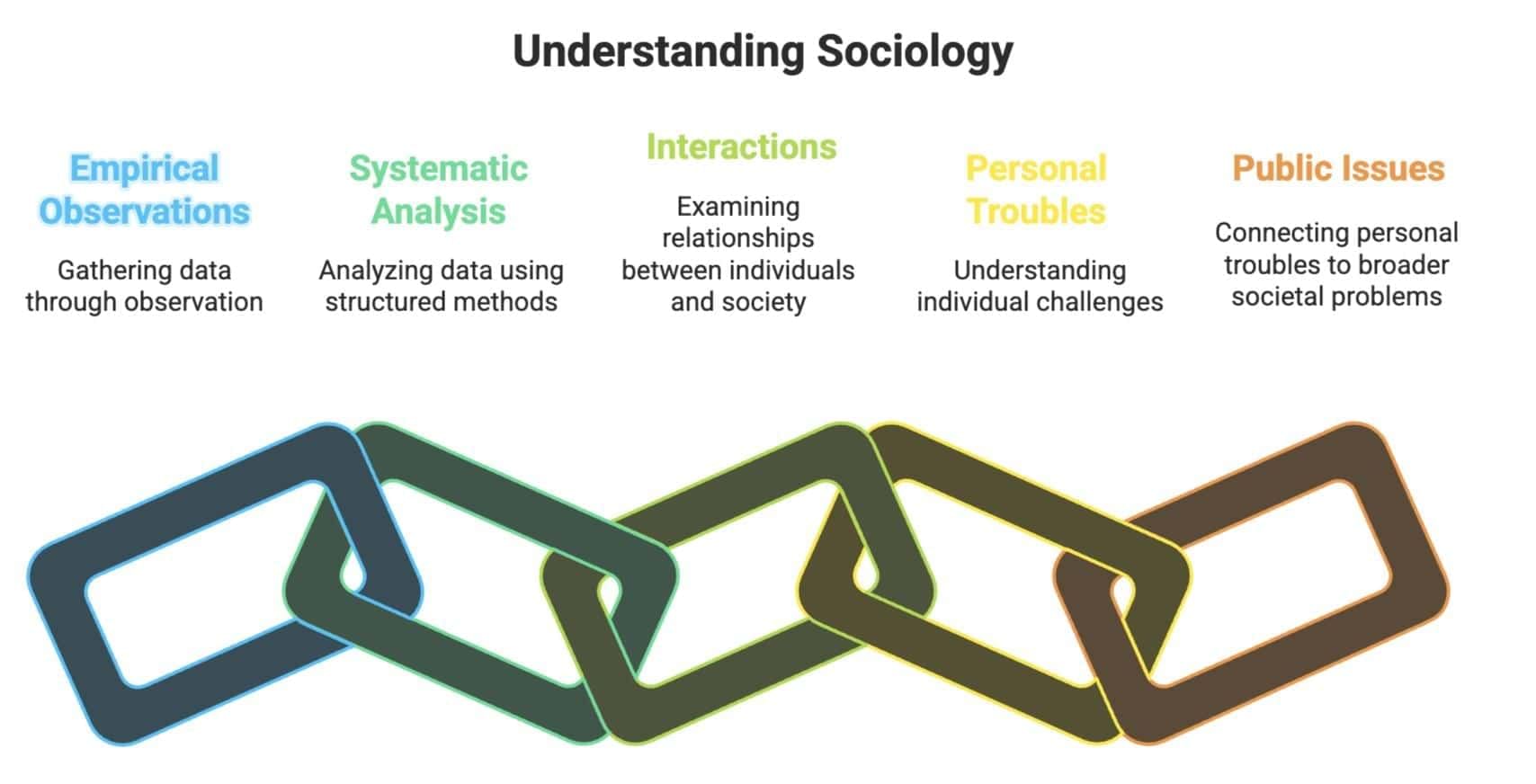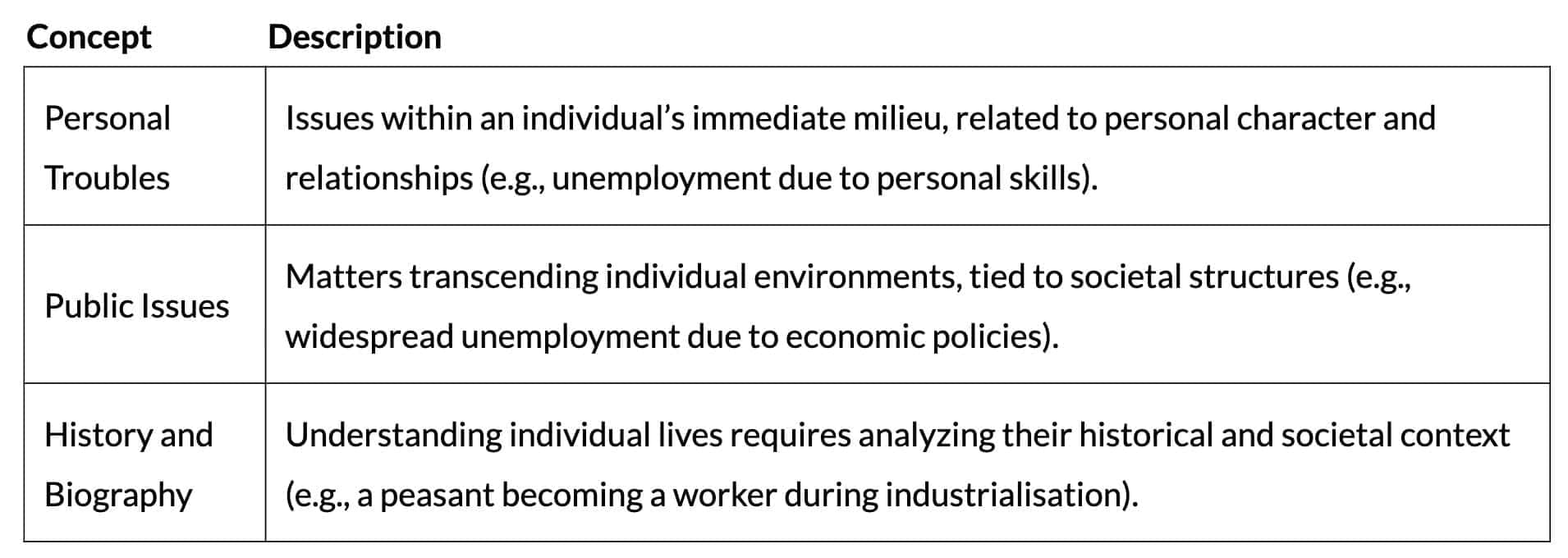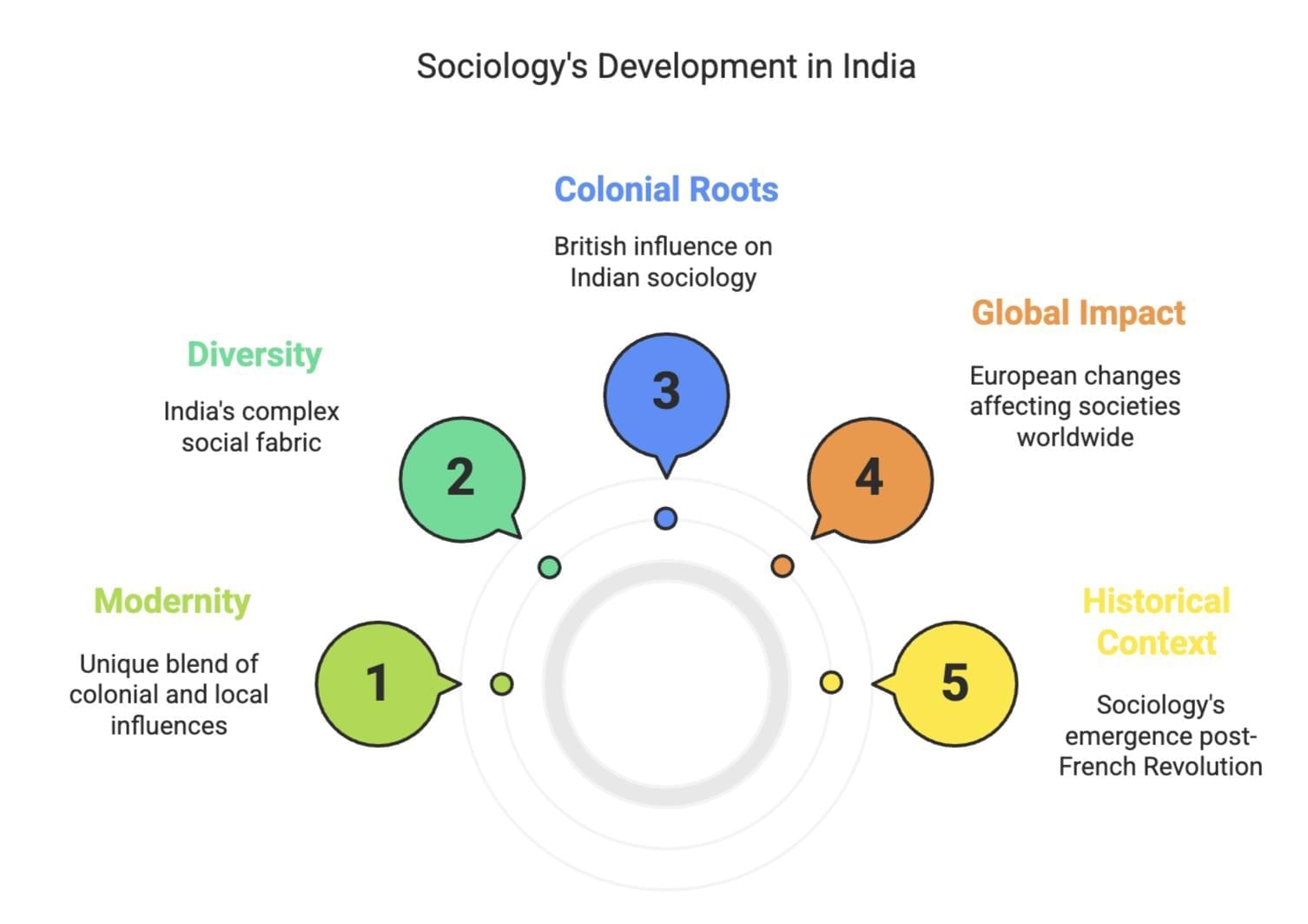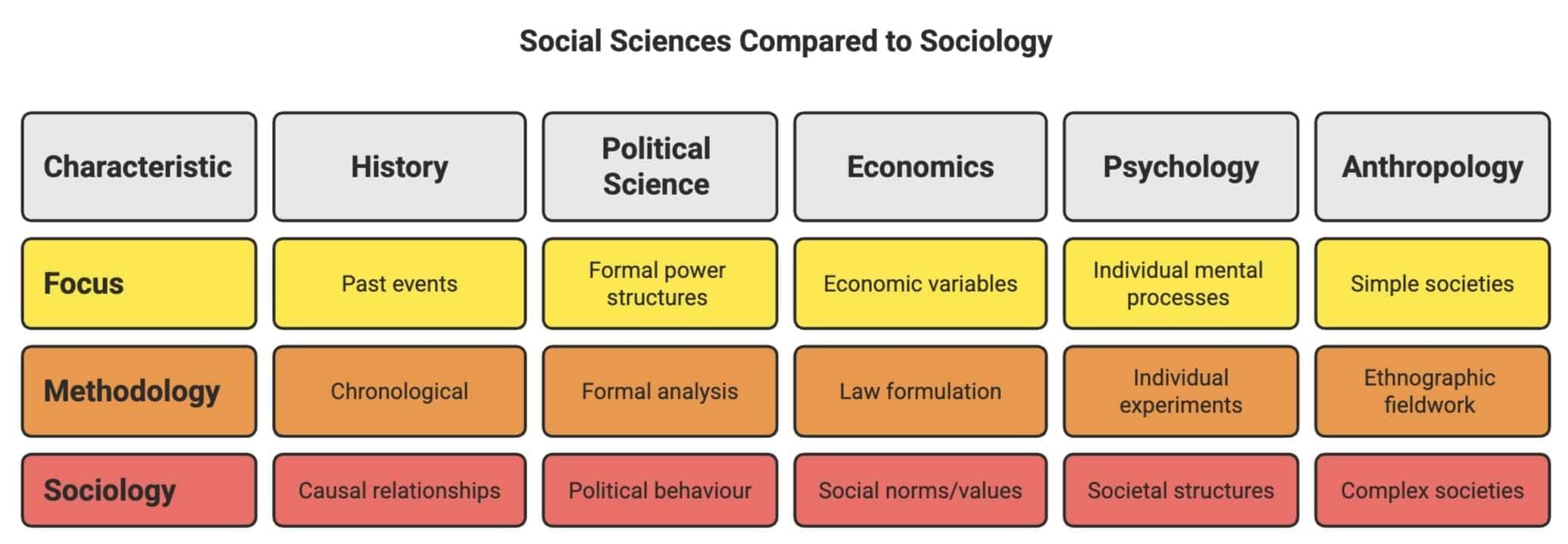Humanities/Arts Exam > Humanities/Arts Notes > Sociology Class 11 > Revision Notes: Sociology and Society
Revision Notes: Sociology and Society | Sociology Class 11 - Humanities/Arts PDF Download

What is Sociology?
- Definition: Systematic study of human social life, groups, and societies, derived from Latin ‘socius’ (companion) and Greek ‘logos’ (study).
- Focus: Interconnectedness of society as a whole and individual-society interactions.
- Distinctiveness: Unlike philosophical/religious reflections or common sense, sociology uses scientific methods to study social behaviour, from individual interactions to large-scale institutions.
Coined by Auguste Comte in 1839, sociology is the youngest social science, emphasising empirical evidence over normative ideals.
Sociological Imagination
C. Wright Mills’ Concept
The sociological imagination connects personal troubles to public issues, linking individual experiences to broader societal structures and historical contexts.

Pluralities and Inequalities Among Societies
- Multiple Societies: Individuals belong to various societies (e.g., Indian society, linguistic/ethnic communities, religious/caste groups).
- Inequalities: Societies differ in wealth, education, and opportunities (e.g., rich vs. poor, educated vs. illiterate).
- Contextual Identity: ‘Our society’ varies by context, complicating sociological analysis due to diversity.
Sociological vs. Philosophical/Religious Thinking
- Philosophical/Religious Thinking: Focuses on moral ideals and how society ought to be, based on norms and values.
- Sociological Thinking: Studies how norms and values function in actual societies using empirical observations, not prescribing ideals.
- Scientific Approach: Sociologists collect evidence systematically, allowing verification and further development of findings.
Sociology vs. Common Sense
- Common Sense: Based on naturalistic/individualistic explanations from personal experience; unreflective and tied to social group perspectives.
- Sociology: Questions origins of beliefs, seeks meaningful explanations, and uncovers connections between actions and behaviours using scientific methods.
Intellectual Ideas in Sociology’s Development
- Early Sociologists: Auguste Comte, Karl Marx, Herbert Spencer classified societies (e.g., hunters, agrarian, industrialised) with an evolutionary view, often seeing Western societies as advanced.
- Enlightenment Influence: Emphasised reason and individualism, viewing issues like poverty as social problems, not natural phenomena.
- Organic Analogy: Society compared to living organisms, with institutions (e.g., family, school) as parts performing specific functions.
Material Issues in Sociology’s Development
Industrial Revolution and Capitalism
- Capitalism: Drove industrial growth with profit-driven attitudes, commodifying goods, services, and labour.
- Urbanisation: Industrial cities created overcrowded slums, poor sanitation, and new social interactions.
- Factory System: Disrupted traditional communities, degraded labour, but fostered collective worker efforts (e.g., Marx’s view of factories as oppressive yet potentially liberating).
- Clock-Time: Industrial work is synchronised by clocks, unlike pre-modern rhythms set by daylight or social duties.
Relevance of Studying Sociology’s European Origins
- Historical Context: Sociology emerged post-French Revolution (1789) amid rapid social changes from capitalism and industrialisation.
- Global Impact: European changes (e.g., urbanisation, factory production) influenced all modern societies, including India, via British colonialism.
- Indian Context: Sociology in India reflects British colonial influence and the need to understand local society for administration.
Growth of Sociology in India
- Colonial Roots: The British need for knowledge of Indian society spurred sociological studies.
- Misrepresentations: Western views (e.g., static Indian villages) prompted Indian scholars to correct biases through sociology.
- Diversity: India’s linguistic, religious, and caste diversity linked sociology with social anthropology, unlike distinct Western disciplines.
- Modernity: Introduced under colonial rule, differing from Europe’s scientific/democratic modernity.

Scope of Sociology

Relationship with Other Social Sciences
- Commonalities: Shares concepts, interests, and methods with anthropology, economics, political science, and history.
- Differences: Each discipline has unique viewpoints and selective interests.
Sociology and History
- History: Studies past events, often chronologically (e.g., kings, wars).
- Sociology: Seeks causal relationships, abstracts from events, focuses on social changes (e.g., land/gender relations).
Sociology and Political Science
- Political Science: Focuses on formal power structures and government administration.
- Sociology: Examines actual political behaviour and interrelationships (e.g., decision-making, gender in politics).
Sociology and Economics
- Economics: Studies economic variables (e.g., price, supply); formulates laws of economic behaviour.
- Sociology: Analyses economic behaviour within social norms/values (e.g., advertising reshaping lifestyles).
Sociology and Psychology
- Psychology: Explores individual mental processes and behaviour.
- Sociology: Studies behaviour as shaped by societal structures and relationships.
Sociology and Anthropology
- Anthropology: Holistically studies simple societies via ethnographic fieldwork.
- Sociology: Focuses on parts of complex societies (e.g., religion, bureaucracy) using surveys and quantitative data.

Social Facts (Emile Durkheim)
- Definition: Ways of thinking, feeling, and acting external to individuals, constraining behaviour, and general across a social group.
- Collective Consciousness: Individual ideas adopted by a group become part of shared societal norms, influencing individual lives.
Conclusion
Sociology systematically studies human society, connecting personal troubles to public issues through the sociological imagination. Emerging from European industrialisation and Enlightenment ideas, it addresses diverse societal inequalities and interactions. In India, sociology reflects colonial influences and cultural diversity, offering critical insights into social change and structures across individual, national, and global levels.
The document Revision Notes: Sociology and Society | Sociology Class 11 - Humanities/Arts is a part of the Humanities/Arts Course Sociology Class 11.
All you need of Humanities/Arts at this link: Humanities/Arts
|
41 videos|105 docs|17 tests
|
FAQs on Revision Notes: Sociology and Society - Sociology Class 11 - Humanities/Arts
| 1. What is the definition of sociology and its main focus? |  |
Ans.Sociology is the systematic study of society, social relationships, and social institutions. It focuses on understanding how individuals and groups interact within various contexts, examining social structures, cultural norms, and the dynamics of power and inequality across different societies.
| 2. What is the concept of sociological imagination and why is it important? |  |
Ans.Sociological imagination refers to the ability to see the relationship between individual experiences and larger social influences. It is important because it helps individuals understand how personal troubles are often rooted in public issues, allowing for a deeper analysis of social problems and encouraging critical thinking about societal structures.
| 3. How does sociology differ from common sense thinking? |  |
Ans.Sociology differs from common sense thinking in that it relies on systematic research and empirical evidence to understand social phenomena, while common sense often involves assumptions and stereotypes that may not be based on facts. Sociological approaches encourage questioning and evidence-based conclusions, rather than accepting beliefs at face value.
| 4. What are some of the key historical influences on the development of sociology? |  |
Ans.Key historical influences on the development of sociology include the Enlightenment, which emphasized reason and scientific inquiry; the Industrial Revolution, which transformed social structures; and the emergence of urbanization and modernity, all of which prompted thinkers like Auguste Comte and Karl Marx to analyze social changes and their implications.
| 5. Why is it relevant to study the European origins of sociology in contemporary contexts? |  |
Ans.Studying the European origins of sociology is relevant because it provides insight into the foundational theories and methodologies that shaped the discipline. Understanding these origins helps contemporary sociologists critically assess and build upon past ideas, address current societal challenges, and appreciate the evolution of sociological thought across different cultures.
Related Searches
















